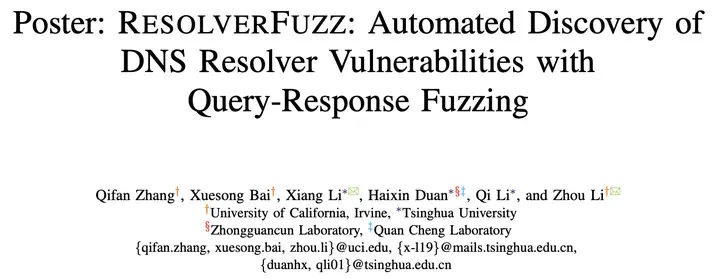Poster: ResolverFuzz: Automated Discovery of DNS Resolver Vulnerabilities with Query-Response Fuzzing

Abstract
Domain Name System (DNS) is a critical component of the Internet. DNS resolvers, which act as the cache between DNS clients and DNS nameservers, are the central piece of the DNS infrastructure, essential to the scalability of DNS. However, finding the resolver vulnerabilities is non-trivial, and this problem is not well addressed by the existing tools. To list a few reasons, first, most of the known resolver vulnerabilities are non-crash bugs that cannot be directly detected by the existing oracles (or sanitizers). Second, there lacks rigorous specifications to be used as references to classify a test case as a resolver bug. Third, DNS resolvers are stateful, and stateful fuzzing is still challenging due to the large input space. In this paper, we present a new fuzzing system termed ResolverFuzz to address the aforementioned challenges related to DNS resolvers, with a suite of new techniques being developed. First, ResolverFuzz performs constrained stateful fuzzing by focusing on the short query-response sequence, which has been demonstrated as the most effective way to find resolver bugs, based on our study of the published DNS CVEs. Second, to generate test cases that are more likely to trigger resolver bugs, we combine probabilistic context-free grammar (PCFG) based input generation with byte-level mutation for both queries and responses. Third, we leverage differential testing and clustering to identify non-crash bugs like cache poisoning bugs. We evaluated ResolverFuzz against 6 mainstream DNS software under 4 resolver modes. Overall, we identify 23 vulnerabilities that can result in cache poisoning, resource consumption, and crash attacks. After responsible disclosure, 19 of them have been confirmed or fixed, and 15 CVE numbers have been assigned.
* ✉ Both are corresponding authors.
* Presented in SHUZIHUANYU Talk.
* Presented in OARC 42
概述
在本文中,我们提出了一个全新的工具ResolverFuzz用来模糊测试解析器。
漏洞编号(15)
分享